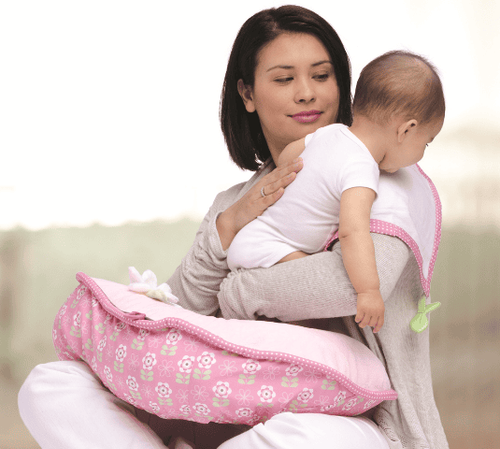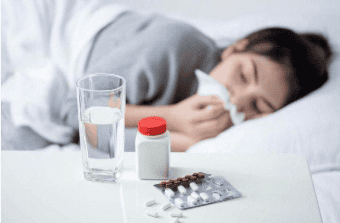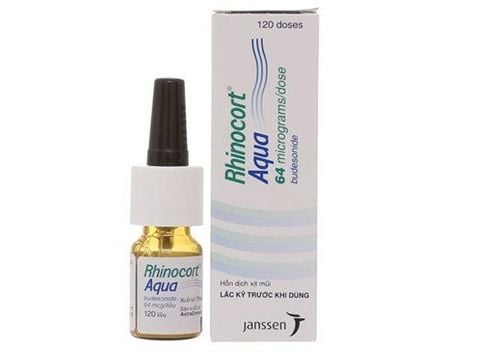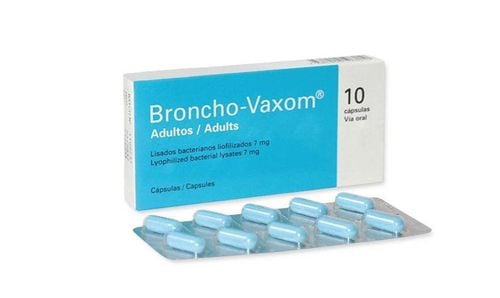This is an automatically translated article.
The article is expertly consulted by Assoc. Dr. Dr. Huynh Thoai Loan - Head of Pediatrics - Neonatology Department, Vinmec Central Park International General Hospital. Uncle is one of the leading experts in Pediatrics - Neonatology in Ho Chi Minh City with nearly 30 years of experience in examining and treating diseases of pediatric endocrinology, pediatric nephrology and other pediatric - neonatal problems.Upper respiratory tract infection is an infection in parts of the upper respiratory tract. This is a disease that easily recurs many times, so it makes many parents worry. So is upper respiratory tract infection dangerous and what are the most effective treatments?
1. Causes of upper respiratory tract inflammation
Upper respiratory tract infection is an infection in the parts of the upper respiratory tract including: nose, pharynx, pharynx, sinuses, larynx. These are organs that have the function of taking air from outside the body, warming, heating and filtering the air before it is put into the lungs. This is the part that is in direct contact with the outside environment, so it is easy to get infected.
Causes Upper respiratory tract infection is caused by a number of viruses and benign bacteria. For children under 5 years old, most cases are caused by viral infections (respiratory syncytial virus, influenza virus, influenza virus, measles, and some fungi...).
Some bacteria cause upper respiratory infections: Hemophilus influenzae type B (abbreviated as Hib), pneumococcus, streptococcus, staphylococcus, Bordetella bacteria...
Respiratory infections can also be caused by many things. Other causes such as: allergies to weather, allergies to other agents in the air, dust, allergies to chemicals,...

2. Symptoms of upper respiratory tract infection
Recognizable symptoms of upper respiratory tract infection such as: high fever, sneezing, runny nose, runny nose, sore throat, hoarseness, cough a lot, body fatigue...
During baby's time Infected children will often have a high fever along with bad breath, abdominal pain, vomiting, and diarrhea. Coughs also have many forms such as prolonged dry cough, cough with sputum, cough in episodes...
Respiratory tract infections will go away on their own after 5-7 days of illness, this is a common disease that is not dangerous but good. Repeated recurrence causes many problems affecting health and daily life. So what are the most effective treatments?
Trắc nghiệm: Thế nào là trẻ sơ sinh đủ tháng?
Đặc điểm bên ngoài của trẻ sơ sinh đủ tháng được thể hiện qua các tiêu chuẩn như: Cân nặng, chiều dài và hình thể. Theo dõi bài trắc nghiệm dưới đây sẽ giúp các bậc cha mẹ hiểu thế nào là trẻ sơ sinh đủ tháng, qua đó có thể đánh giá tổng trạng sức khỏe và sự phát triển của bé yêu nhà mình.The following content is prepared under supervision of Thạc sĩ, Bác sĩ y khoa, Ma Văn Thấm , Nhi , Phòng khám Đa khoa Quốc tế Vinmec Dương Đông(Phú Quốc)
3. How to treat upper respiratory infections
You can refer to and apply the following methods to treat upper respiratory infections in babies:
3.1. Drug treatment Drug treatment is mainly the use of drugs to reduce cough, reduce fever, anti-inflammatory locally,... It should be noted that you should not buy drugs for your baby's own use, should use drugs according to the condition. child's illness and must be prescribed by a doctor.
In cases where the cause of the disease is known, most of the time, the symptoms will be treated with the drugs mentioned above. In case of upper respiratory tract infection caused by bacteria, antibiotics and anti-inflammatory drugs can be used as prescribed by the doctor.
3.2. You can help your baby quickly recover from the disease by doing the following:
With a child with a stuffy nose, a lot of runny nose:
Clear the baby's nose by taking a soft dry towel (towel) paper is best). Use physiological saline for children, put drops on both sides of the nose to dilute the nasal secretions, then take out the nasal secretions with a nasal aspirator (do not use the mouth to suck the baby's nose, because the adult mouth has many bacteria). harmful bacteria). Finally, use a clean cotton swab to dry your nose. Clear the baby's nose before feeding or feeding if the baby's nasal discharge is too much, thick. This will prevent the baby from vomiting while eating. Do not abuse physiological saline to clear the baby's nose, because it is easy to cause atrophy of the nasal mucosa. The baby should be placed in a high position or held in a standing position parallel to the mother's body. Keep baby's body warm in cold weather, keep baby clean, avoid in humid places.

For children with high fever:
If the child has a fever at a temperature of 37.5 - 38.5 degrees Celsius, let the child lie in a cool room, wear cool clothes. Let the baby drink a lot of water, cool the baby in the forehead, armpit, groin area with warm water. Feed the baby well, measure the child's body temperature to monitor whether the child has a fever. For children with a fever above 38.5 degrees Celsius: continue to cool the forehead, armpits and groin areas for the baby with warm water. Give your child an oral or rectal antipyretic (paracetamol with a dose of 10-15mg/kg/time). After 4-6 hours, you can continue to use fever-reducing medicine if the baby's body temperature is still above 38.5 degrees Celsius. It can be combined with a warm bath to lower the body temperature to avoid convulsions when the fever is too high. . With cough symptoms:
Parents can also give the baby a little diluted honey, or give the child steamed kumquats with sugar and ginger will also help relieve cough effectively. In addition, when coughing a lot, you can use some herbal cough medicine or cough medicine with a doctor's prescription. Children with vomiting:
When the child vomits, let the baby lie on his or her head to one side, clean the vomit from the mouth, nose, throat, ... If the child vomits a lot with sunken eyes, wrinkled skin, children If you are tired, you should bring your baby to the doctor immediately for timely treatment. Many people are still worried that upper respiratory infections are dangerous? As mentioned above, this is a common benign disease. But if you see one of the following symptoms, take your baby to the doctor right away for timely treatment:
Baby can't eat or drink milk. Children with difficulty breathing, shortness of breath, chest indrawing ... this is a manifestation of pneumonia, which is also a dangerous complication of upper respiratory tract infection. Children with high fever lasts from 2 to 5 days.
4. Prevention of upper respiratory tract infections
Upper respiratory tract infection is the most common and common disease in young children. Therefore, preventive measures are put first:
Give your baby all the vaccinations in the national immunization program. Breastfeed the baby fully, do not wean too early. Limit your baby to crowded places during the epidemic season. Maintain hygiene for the baby, especially the habit of washing hands before eating to kill the virus. Give your baby a reasonable diet, all nutrients to be more active in increasing the baby's resistance. These are simple but very effective preventive measures in preventing upper respiratory tract infections in young children. Please take the child to the nearest medical facility as soon as there are abnormal signs such as high fever, cough, prolonged vomiting, difficulty breathing, chest constricting breathing, diarrhea... for accurate diagnosis and treatment. prompt treatment to avoid dangerous complications.
Pediatrics department at Vinmec International General Hospital is the address for receiving and examining diseases that infants and young children are susceptible to: viral fever, bacterial fever, otitis media, pneumonia in children, .... With modern equipment, sterile space, minimizing the impact as well as the risk of disease spread. Along with that is the dedication from the doctors with professional experience with pediatric patients, making the examination no longer a concern of the parents.
If you have a need for consultation and examination at Vinmec Hospitals under the nationwide health system, please book an appointment on the website for service.
>> See more: Upper respiratory tract infection in children and how to avoid illness in the cold season - Article written by Doctor Le Tuyet Nga - Specialist I - Pediatric Center - Vinmec International General Hospital Times City
Please dial HOTLINE for more information or register for an appointment HERE. Download MyVinmec app to make appointments faster and to manage your bookings easily.















